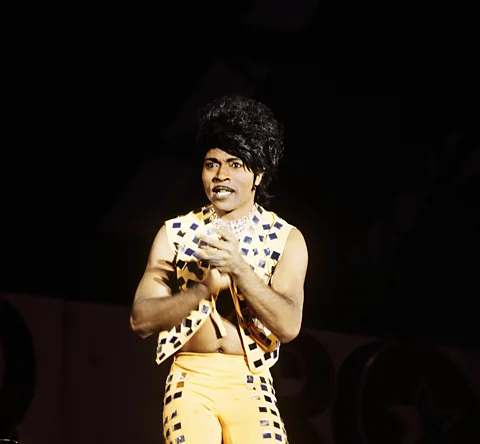 Getty Images
Getty ImagesEarly recording sessions in New Orleans failed to capture the magic. Producer Robert “Bumps” Blackwell said he didn’t appreciate Richard until he saw him play at the city’s famous Dew Drop Inn. He said: “That was when I begin to know and understand Richard, because all you’ve got to do is give Richard an audience, turn the lights on, and the show is on.” Richard’s bandmate and friend Ron Jones recalled in the Arena documentary: “He jumped on the piano and sang, ‘Awop-bop-a loo bop alop-bam-boom!’ So they heard it and said, ‘Wait a minute, what’s that?’ It was a hook that they had never heard before, but Richard had been singing that phrase for years on the Chitlin’ Circuit.”
Richard’s influence spanned generations and genres
But if Tutti Frutti was going to be a hit record, its risqué lyrics needed a major rewrite. Deacon John, former band leader at the Dew Drop Inn, told Arena: “The lyrics could be interpreted as gay sex. They’re not going to play that on the radio!… And everybody knew, this ain’t about ice cream! But the primary reaction from the producer’s point of view was, ‘Hey, this sounds like a hit record.'” Producer “Bumps” Blackwell said: “I asked him did he have a grudge against making money? He said, ‘No.’ I said, ‘Good.’ So we wrote the words,’Tutti frutti, oh rooty,’ and a girl named Sue and a girl named Daisy, put Richard on the piano, and in 15 minutes I think we cut two or three cuts, and it’s been history ever since.”
The recording may have been unbeatable, but in the US it wasn’t the biggest hit version. The man who introduced the delights of Tutti Frutti to the mainstream was Pat Boone, a squeaky-clean square who specialised in taming rock’n’roll for a mostly white audience. If he had known about the original lyrics at the time, he probably would have been appalled. Boone told Arena: “What I wanted to sing were songs about love and happiness and all that. That was what they played on the radio back then. Rhythm and blues music was called race music. Here I am, a church-going white kid from Nashville. I knew very little of it. But then when I heard a song by Little Richard called Tutti Frutti, I just flat-out loved it and so I thought, ‘I’m going to do my version of it.'” It sold one million records.
More like this:
• Nina Simone on how racial injustice fuelled her songs
